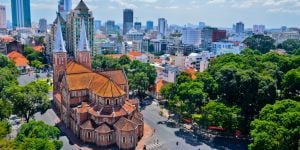Why don't Vietnamese understand Vietnamese spoken by a foreigner?
Last activity 14 February 2022 by monny.nguyen
81398 Views
663 replies
Subscribe to the topic
Post new topic
Ciambella wrote:Yes, Colin, it's Western-style street talk, directly translated from English while removing the required personal pronouns. It's fine (even considered hip) between close friends and among a younger crowd, but it's too brusque to be used with strangers or one's parents (especially parents-in-law, for the Westerners who married into Vietnamese families.)
Edit to add:
Since Vietnamese language emphasizes respect, skipping the needed "I" and "you" is to remove the core of the language. Instead of "mai gặp lại" (see [presumably you] tomorrow) a better and correct way would have been "gặp lại anh/em ngày mai" (see you again tomorrow) or "mai mình [sẽ] gặp lại" (we'll see [each other] again tomorrow.)
The removing or adding of one word makes a lot of difference to a sentence.
It's mostly used by teens and 20somethings. I doubt an older local would use that language.
colinoscapee wrote:It's mostly used by teens and 20somethings. I doubt an older local would use that language.
Precisely.
And that's one problem (of many) in learning a new language. We copy the locals because we think that's the way we should speak, while unbeknown to us, the way some locals speak is something we should never immitate if we want to receive welcome and respect.
It's a bit like when locals watch English language movies, hear things and think,that's cool. Last week at my tạp hóa, a friend of the shop owner gave me a "fu#k you."I then preceded to tell her that it's not a good thing to say, but she thought it was and nearly fell off her chair laughing.
Ciambella wrote:Yes, Colin, it's Western-style street talk, directly translated from English while removing the required personal pronouns. It's fine (even considered hip) between close friends and among a younger crowd, but it's too brusque to be used with strangers or one's parents (especially parents-in-law, for the Westerners who married into Vietnamese families.)
Edit to add:
Since Vietnamese language emphasizes respect, skipping the needed "I" and "you" is to remove the core of the language. Instead of "mai gặp lại" (see [presumably you] tomorrow) a better and correct way would have been "gặp lại anh/em ngày mai" (see you again tomorrow) or "mai mình [sẽ] gặp lại" (we'll see [each other] again tomorrow.)
The removing or adding of one word makes a lot of difference to a sentence.
In Hong Gnu a couple of years ago, my Long Haired Dictionary used to tell me: "Nge Mai Gap Lai"(phonetic spelling) when she used to disappear after work. Her English was generally, mmmmmm only just adequate - but not as bad as a previous interpreter I had, Tony, who once described a 500lb bomb crater in a rice field as a "place for fix racing" - He meant a hole dug for the breeding of fish, which was utter ballcocks.
Ciambella wrote:Were there fish in the crater?
The crater was in the middle of a rice field of about a kilometre and a half long. Actually there were three craters in a line, two craters were a hundred metres apart, the third crater was about 300 metres from the first crater. All the craters were in a straight line. The locations of the craters were broadly in line with the US bombing data record of that area.
I deduced a number of things from the location of the craters:
a. It was likely that the craters were the result of a single pass and delivery by an aircraft carrying 4 bombs.
b. It seemed as if the pilot of the aircraft that delivered the bombs, had dropped them in the rice field rather than on the villages located on slightly higher ground, on either side of the rice field.
c. Again, from the US bombing data record, I found that the bombing took place late in the Vietnam / American war. You can draw your own conclusions from this fact and my opinion at b. above.
d. The fact that the craters were actually bomb craters was confirmed by fragments of bomb case recovered from the crater walls, following a magnetometer search, which were consistent with Mk82 US 500 pound bombs.
e. The fact that the first two craters were roughly 100 metres apart and the third crater was 300 metres distant from the first crater indicates that there was probably a bomb between the second and third crater, which was either:
* Unexploded, or,
* Which had exploded deeper underground and had formed a camoflet (cavity), without breaking the surface and forming a crater.
At the time of my visit the rainy season was just about ended and the rice fields were draining. There was about 20 Cm or less of water in the rice fields and, due to the rainy season, the craters were water filled. People were still fishing - and catching fish - in the rice fields so it is reasonable to assume that there would be fish in the craters too although I didn't see any (but wasn't looking for fish anyway).
I have heard of people using bomb craters in this way but this is the first such account that I would consider authoritative. Matt, have you ever considered writing a book about your EOD experiences?
I'm in the middle of writing it now. Its a long process but heres a taster which I published on the Oilpro website a couple of weeks ago: http://oilpro.com/post/31283/thought-d-heard-all
>> 3 men with trollies full of golf bats <<
Ha. Even I, an old duck who can't tell the difference between a putter and a brolly stick, know straight away that one would never find a Louisville Slugger on a golf course.
Ciambella wrote:>> 3 men with trollies full of golf bats <<
Ha. Even I, an old duck who can't tell the difference between a putter and a brolly stick, know straight away that one would never find a Louisville Slugger on a golf course.
Please either send us the decryption keys or post again in English!
Actually I do know that golf ball striking tools are clubs and not bats, but as an author, I am allowed a little license 
Ciambella wrote:Thank you for mentioning b and c, Matt.
When I write stuff I try to be as factual as possible and I saw more than a couple of circumstances which led me to similar conclusions about the war here.
Anyway, we have drifted well off subject here so, back to why don't they, etc....
A couple of weeks ago I said chào buổi sáng to a man walking round our estate. I hadn't seen him before and, as I was on my normal morning exercise walk within our compound and because we all greet each other at that time of day, I wished him a good morning.
His response to my greeting was: "Jaa, mup wah" 
Ignorant git!
My vocab is eclectic, I know. It's a result of learning English at a tender age from a French speaker. Plus 20+ years living with an Irish-English who lives and speaks bodysurfing and American sports, especially baseball. Plus months and months couch surfing (before couch surfing caught on as a modern day cheap lodging) from Manchester to Cornwall. Plus almost a decade being corrected by all sorts of Europeans who insisted that they spoke the true everyday English. Plus half a dozen years breathing in the regional dialects of American Southern states.
My accents are even more confusing.
Maybe I just stick to Vietnamese, which brings the question: Why would you say chào buổi sáng to a Vietnamese? There is formal, and there is FORMAL. Yours is the latter.
I would have said back to him, Thank you bác. Kill them with kindness and throw them off at the same time. Vietnamese are not known for their tact (not saying I agree with him on your physique!  )
)
Ciambella wrote:My vocab is eclectic, I know. It's a result of learning English at a tender age from a French speaker. Plus 20+ years living with an Irish-English who lives and speaks bodysurfing and American sports, especially baseball. Plus months and months couch surfing (before couch surfing caught on as a modern day cheap lodging) from Manchester to Cornwall. Plus almost a decade being corrected by all sorts of Europeans who insisted that they spoke the true everyday English. Plus half a dozen years breathing in the regional dialects from American Southern states.
My accents are even more confusing.
Maybe I just stick to Vietnamese: Who would say chao buoi sang to a Vietnamese?
Are you saying Chao buoy etc is wrong?
Interestingly, I used to speak German (Hoch Deutsch) with an accent that, on the telephone, led many Germans to suppose that they were taking to a fellow German - That is until my vocab ran out. But thats because the military German language school I attended was superb and, I had 7 or so German staff working for me at the time.
Here in Vietnam I am teaching my wifes nephew to speak English in the school holidays - from his own school lesson books (I want to kill and eat Champa the bloody sun bear!). He has picked up on my slight Yorkshire accent and pronounces "done" as dun - and has a similar Yorkshire inflection with a few other words now. Which is going to blow his school English teachers mind (I'm convinced she can't speak English at all).
I would love to teach him the Yorkshire dialect "ee, bah 'eck, nahthen, sithee".
No, it's not wrong, but it's very, very, very formal. I don't know anyone who has ever said it, except foreigners. (I edited my last post to include some explanation, at the same time you posted your comment).
A simple "Chào ông" is polite enough, and if he mentions your physique again, use the sentences everyone talked about a couple of days ago, "Cảm ơn ông nhiều lắm. Gặp lại ông ngày mai." Just for the heck of it.
I bet he'll never be rude to you again.
Ciambella wrote:No, it's not wrong, but it's very, very, very formal. I don't know anyone who has ever said it, except foreigners. (I edited my last post to include some explanation, at the same time you posted your comment).
A simple "Chào ông" is polite enough, and if he mentions your physique again, use the sentences everyone talked about a couple of days ago, "Cảm ơn ông nhiều lắm. Gặp lại ông ngày mai." Just for the heck of it.
I bet he'll never be rude to you again.
What I said to him in return was actually a good deal worse. But not for quoting on here 
BTW, this is for anyone out there who already speaks some Vietnamese and wants to show that you do know the language and not just repeating a few sentences by rote:
Adding "nhé" at the end of your sentence (not all of them) is a good way to bring a smile onto the listener's face. It's a word that cannot be translated, nor does it have an equivalence in any language. Its function is to put a very slight emphasis to the verb/statement you use in the sentence, almost (but not quite) similar to the way Americans add "OK?", French speakers add "n'est-ce pas?", and Italians add "sì?" to the end of a sentence.
For example:
"Gặp lại em ngày mai" is "I'll see you again tomorrow", but "Gặp lại em ngày mai nhé" is "I'm looking forward to see you again tomorrow", or "Does it suit you that we'll see each other again tomorrow?" All of those sentiments can be replaced with a simple "nhé". And the best thing is, you will not sound desperate when saying "nhé" the way you would sound when you add the other sentiments to your request.
If the listener is not your SO but your mother-in-law, for instance, then "nhé" would show the sincerity in your wish to see her again. She would be happy hearing that.
Note: Please do not imitate this pronunciation for the word "nhé". https://www.howtopronounce.com/vietnamese/nh%C3%A9/
It's not correct. I'll find my own recording from Forvo and post a link later.
My theory ( confirmed by more than one native) is that when they see a Western face to expect everything that comes out of the pie hole to be English. In my experience, there are also people who just don't care to try to understand us.
-JohnD- wrote:My theory ( confirmed by more than one native) is that when they see a Western face to expect everything that comes out of the pie hole to be English. In my experience, there are also people who just don't care to try to understand us.
I don't think they don't care to try understand you. ( or if yes, only a few people). I think it's because our habbits: don't try to talk, to give ideas or don't try to join conversations. Please note that our education is different from yours. In our generation and older, we were not encouraged to explain our idea. We use to do as the older told ( or expected to do as adults told instead of trying to give explaination/ ideas. This was happned in families and classes).
For me, it's easier for me to understand a Vietnamese speak English than a foreigners who speak English ( even native speakers)  )) . We get similar mistakes in pronouncing that we can guess when we hear other Vietnamese speaking English.
)) . We get similar mistakes in pronouncing that we can guess when we hear other Vietnamese speaking English.
I have the very same problem speaking to Vietnamese-Americans in the U.S.! If I'm ordering food inside a Viet restaurant, then they usually figure it out, but often repeat what I say to make sure they understood. The sounds they take for granted are ones that are more difficult to distinguish once you attempt to learn a language post-puberty.
I have mentored young Chinese students near Wash., DC. Nearly all have an undergraduate degree or working on one, many have a graduate degree, and most have taken a year of DAILY English classes -- even though they already spoke English from years of watching American movies & music videos and years of classes since GRADE SCHOOL! Yet there are times when they speak and I haven't a clue what they're saying because of mispronunciation.
Your girlfriend is right: CALM DOWN ... be patient ... you're never -- @ your age -- are going to speak without an accent nor perfect Vietnamese. You'll probably not be understood at times for the rest of your life. The oft undistinguishable "sounds" that your now older ears will have difficulty understanding at times, just is part of the adjustment phase of moving to VN. Your Vietnamese will be better than mine, but I won't let that disturb my time in VN.
It will take time.
... to YOUR ears!
Lyn-sunflower wrote:-JohnD- wrote:My theory ( confirmed by more than one native) is that when they see a Western face to expect everything that comes out of the pie hole to be English. In my experience, there are also people who just don't care to try to understand us.
I don't think they don't care to try understand you. ( or if yes, only a few people). I think it's because our habbits: don't try to talk, to give ideas or don't try to join conversations. Please note that our education is different from yours. In our generation and older, we were not encouraged to explain our idea. We use to do as the older told ( or expected to do as adults told instead of trying to give explaination/ ideas. This was happned in families and classes).
For me, it's easier for me to understand a Vietnamese speak English than a foreigners who speak English ( even native speakers))) . We get similar mistakes in pronouncing that we can guess when we hear other Vietnamese speaking English.
As someone in my 70's and whose experience in Vietnam goes back to 1969, I compliment you for making your excellent point about respect paid to elders. As the closest thing my wife's family had to a family patriarch was her Grandmother, I sort of inherited that position when her Grandmother died in 1975. Definitely an interesting and educational experience.
Having lived in Vietnam for 10 years and studied Vietnamese for a few months at the University of Social Sciences and Humanities it never ceases to amaze me that if I speak and pronounce a Vietnamese phrase perfectly to most Vietnamese, they don't understand me. Every time I check out my groceries I say to the clerk, "Khỏe không?" after that is not understood, I say, "Em có khỏe không?", still no comprehension. About this time somebody in the line will say in a whisper, "Khỏe không?" and then the clerk repeats what I just said and apologizes. So I have asked numerous times if my pronunciation is clear or not? My instructor and everyone says I speak fairly well, so what is that?? Even if a Vietnamese speaks to me in poor English, I understand most of what he/she said but it seems not to work the other way around. Some people say they must have thought I was speaking English; why would I speak English to a Vietnamese? I have a few theories and have read others thoughts. It truly boggles the mind that most of the population doesn't understand their own language if not spoken by a Vietnamese. My Vietnamese is really good to some Vietnamese and really bad to others. I still like the people and enjoy every day here. I think there is a bit of masochism in me as I just realized I enjoy the constant war of comprehension.
I've been learning for about a year and a bit and they can understand me fine...not all the time though as I'm still learning and make errors but I can have basic conversations now. So it is definitely possible. At the start you will speak very poorly and can hear / understand pretty much nothing which is frustrating but the more you try / practice the easier and better you will get. So don't be discouraged and take your time 
I do believe wrote:I think there is a bit of masochism in me as I just realized I enjoy the constant war of comprehension.
I speak pure Vietnamese with correct grammar and precise vocab. One of these days, we should meet. You'll buy my husband a cà phê sữa nóng and me a plate of bánh cuốn, and I'll guide you through the nuances of a very twisted language (anyone who's brave enough to try explaining his dental problem in Vietnamese deserves my help.) After that, if people still not understand, you can be very assured that the problem is theirs, not yours. 
@ all lurkers: This is not an advert for free tutoring/exchanging language job, so please do not send me requests for contact. 
My problem is that when trying to learn Vietnamese I focused mainly on the bad words and can't remember the good useful stuff that much. I love telling a taxi driver I'd like to go to a "strip club" (anh muon di bia om bay gio vi anh muon bop nhieu buoi dep) and make him laugh but I had a hard time speaking with my mother in law!
Ciambella wrote:"Buoi"? Somebody's teaching you slangs.
I'm very good with fruits, starting with "chanh", "cam" and "buoi" ;-)
Ciambella wrote:"Buoi"? Somebody's teaching you slangs.
He may know that slang and know well what does this sentence mean. As he said, he forcus on bad words
Ciambella
So, you are Bella. You said, "I speak pure Vietnamese with correct grammar and precise vocab." I would love to meet you but then you would find out what a fraud I am. Ha ha. By the way, why did you make up an improper abbreviation of the word, "vocabulary?" That is not precise English let alone necessary.
Cheers
I do believe wrote:By the way, why did you make up an improper abbreviation of the word, "vocabulary?" That is not precise English let alone necessary.
Cheers
Sorry about that. I was typing the post while being in Hangouts with daughter in the States. Since she typed over 120 wps while I hadn't been able to place more than 4 fingers on the keyboard at the same time, I had to shorten some words when she and I "talked", and ended up carrying that to my post. I don't usually go beyond the more often used words such as vocab, morn, diff, oft, K, info, etc.. I would never be lazy enough to use U, lite, nite, donuts, B4, cuz, or Xmas.
I find I have to make an effort not to use short forms or acronyms. I have difficulty interpreting spoken Vietnamese and then the speaker uses a short form which makes me go crazy. One of my friends said to me in Vietnamese, "đợi" and got quite exasperated with me because I didn't recognize, "chờ đợi."
try also the bad words...  perhaps they would understand
perhaps they would understand  )))....
)))....
I do believe wrote:One of my friends said to me in Vietnamese, "đợi" and got quite exasperated with me because I didn't recognize, "chờ đợi."
In this case, it's not a short form because "đợi" and "chờ" mean the exact same thing, and you can use either, both, or switch the order: chờ đợi = đợi chờ = chờ = đợi.
There are quite a few similar cases in Vietnamese. At the top of my head:
Ngóng trông (look forward to, expect) = trông ngóng = ngóng ; all of them mean the exact same thing. However, "trông" by itself means see or look after.
If you use one word from each term, you'll have "trông đợi" or "ngóng đợi", or "trông chờ", or "mong chờ", or "chờ mong", or "trông mong", all of them mean expect, because "mong" means hope, and because when you add "trông" with a word that means waiting (chờ, đợi) , you add intensity to the action.
That's one of the many nuances of the language.
Ciambella wrote:I do believe wrote:By the way, why did you make up an improper abbreviation of the word, "vocabulary?" That is not precise English let alone necessary.
Cheers
Sorry about that. I was typing the post while being in Hangouts with daughter in the States. Since she typed over 120 wps while I hadn't been able to place more than 4 fingers on the keyboard at the same time, I had to shorten some words when she and I "talked", and ended up carrying that to my post. I don't usually go beyond the more often used words such as vocab, morn, diff, oft, K, info, etc.. I would never be lazy enough to use U, lite, nite, donuts, B4, cuz, or Xmas.
Lolz 
Lyn-sunflower wrote:Ciambella wrote:"Buoi"? Somebody's teaching you slangs.
He may know that slang and know well what does this sentence mean. As he said, he forcus on bad words
If you knew how bad I can get with some words you'd be traumatized, I use the "fruits" and bird slangs only when trying to restrain myself, but this year I'll try to focus on learning casual conversation stuff :-D
Ciambella wrote:I do believe wrote:One of my friends said to me in Vietnamese, "đợi" and got quite exasperated with me because I didn't recognize, "chờ đợi."
In this case, it's not a short form because "đợi" and "chờ" mean the exact same thing, and you can use either, both, or switch the order: chờ đợi = đợi chờ = chờ = đợi.
There are quite a few similar cases in Vietnamese. At the top of my head:
Ngóng trông (look forward to, expect) = trông ngóng = ngóng ; all of them mean the exact same thing. However, "trông" by itself means see or look after.
If you use one word from each term, you'll have "trông đợi" or "ngóng đợi", or "trông chờ", or "mong chờ", or "chờ mong", or "trông mong", all of them mean expect, because "mong" means hope, and because when you add "trông" with a word that means waiting (chờ, đợi) , you add intensity to the action.
That's one of the many nuances of the language.
Thanks - good information
Ciambella wrote:I do believe wrote:By the way, why did you make up an improper abbreviation of the word, "vocabulary?" That is not precise English let alone necessary.
Cheers
Sorry about that. I was typing the post while being in Hangouts with daughter in the States. Since she typed over 120 wps while I hadn't been able to place more than 4 fingers on the keyboard at the same time, I had to shorten some words when she and I "talked", and ended up carrying that to my post. I don't usually go beyond the more often used words such as vocab, morn, diff, oft, K, info, etc.. I would never be lazy enough to use U, lite, nite, donuts, B4, cuz, or Xmas.
WHAT! Those are great abbreviations! Now when I use "np" for NO PROBLEM, "b4" for BEFORE or "2" for TO" or "4get" for FORGET, "r" for ARE or "b" for BE, I might lose some. E.G., "2 b or not 2 b, that's the question. R u ok w/ that"
Because they think that you are speaking english not vietnamese. They try understand you in english. So, you keep speaking english to them until they do not understand is to speak vietnamese.
Articles to help you in your expat project in Ho Chi Minh City
 Student life in Ho Chi Minh City
Student life in Ho Chi Minh CityAs Ho Chi Minh City continues to gain a reputation as a hub for engineering and telecommunications, more and more ...
 Choosing your neighbourhood in Ho Chi Minh City
Choosing your neighbourhood in Ho Chi Minh CityChoosing your neighbourhood may not be an easy task, especially if you are a newcomer to Ho Chi Minh City. While ...
 Accommodation in Ho Chi Minh City
Accommodation in Ho Chi Minh CityHo Chi Minh City, formerly known as Saigon, is an ideal Vietnamese destination for travellers and expats. If you ...
 Getting around Ho Chi Minh City
Getting around Ho Chi Minh CityOf all the idiosyncrasies that come with living and working in Ho Chi Minh City, the commute has to be one of the ...
 Leisure activities in Ho Chi Minh City
Leisure activities in Ho Chi Minh CityOne of the most interesting aspects of living in Ho Chi Minh City is the fact that theres never a shortage of ...
 Buying property in Ho Chi Minh City
Buying property in Ho Chi Minh CityAs Vietnams economic boom continues to boost it towards global recognition, the more appealing it has become among ...
 Where to Live in Saigon or Ho Chi Minh City
Where to Live in Saigon or Ho Chi Minh CityWhen looking for a new house or apartment in Saigon it pays to consider where best to live. Some ...
 Shopping in Saigon
Shopping in SaigonThis posting is intend for the new expats in Saigon, people who want to relocate to Saigon and of course, people ...
Find more topics on the Ho Chi Minh City forum



